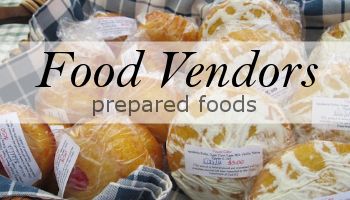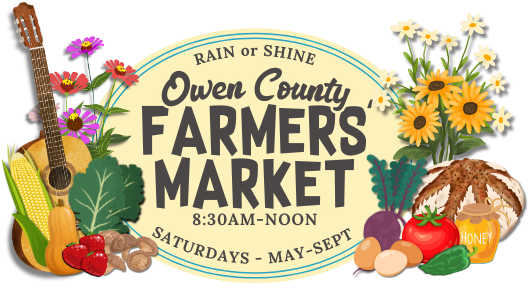
Food Vendors
Home Based Vendor Foods must (according to the state) be prepared at the vendor’s residence, cannot be potentially hazardous (meaning they do not need refrigeration), and they can not be sold for resale. Home Based Vendors Guide.
Prepared Foods are foods that are meant to be consumed at the Market such as coffee, tea, pastries, sandwiches, etc.
Who is a home-based vendor?
Pursuant to newly enacted (effective 7/1/22) code: IC 16-42-5.3, “A home based vendor shall prepare and sell only a food product that is:
- made, grown, or raised by an individual at the individual’s primary residence, including any permanent structure that is on the same property as the residence;
- not a potentially hazardous food product;
- prepared using proper sanitary procedures;
- not resold; (e.g. you must sell to the end user not someone who intends to resell; if you did this you must be licensed as a wholesaler).
What products may a home-based vendor sell?
Home-based vendors are allowed to sell non-potentially hazardous foods. Non-potentially hazardous foods are those that do not require refrigeration for food safety. This list of allowable foods has not changed and includes:
- Baked items
- Candy and confections
- Produce, whole and uncut
- Tree nuts, legumes
- Pickles processed in a traditional method (e.g. fermentation)
- Honey, molasses, sorghum, maple syrup
- Mushrooms grown as a product of agriculture (wild mushrooms should be certified)
- Traditional jams, jellies and preserves made from high-acid fruits and using full sugar recipes (This is the only home-canned food allowed.)
All home–based vendors must obtain a food handler certificate from a certificate issuer that is accredited by the American National Standards Institute” (ANSI). ServSafe Food Handler training fulfills this requirement. This certification is valid for three years. Training options to fulfill this requirement include:
- The Purdue Extension Food Safety Team offers in–person food handler trainings. Call your local Purdue Extension office or visit the Purdue Extension ServSafe website to find classes as they
are scheduled. Cost is around $40. https://ag.purdue.edu/department/extension/servsafe/servsafe-food-handler-trainings.html - For those who prefer an online option, two options are:
- https://www.servsafe.com/ServSafe-Food-Handler– cost is $15
- https://www.efoodhandlers.com/ – cost is $10
What are labeling requirements?
All food products produced by home–based vendors must include the following information:
- The name and address of the producer
- The common or usual name of the food product
- The ingredients of the food product, in descending order by weight, including sub–ingredients in parentheses, e.g. for chocolate chip cookies, the chocolate chip ingredients must be listed in
parenthesis after “chocolate chips” - The net weight or volume of the food product by standard measure or numerical count
- The date on which the food product was processed
- The following statement in at least 10–point type: “This product is home produced and processed and the production area has not been inspected by Indiana Department of Health.
NOT FOR RESALE.” - Additional information can be found through the Indiana Home-Based Vendor Food Product Labeling Overview
Additional product requirements
- Home-based Products must be prepared in accordance with HB 1149 (available upon request).
- Vendor must obtain and display all permits required by state and local law, including ANSI-accredited food handlers permit, health permits and any other applicable permits.
- Food must not be older than 1 year from the date of sale at the market.
- Certificate of Liability Insurance listing the “Owen County Farmers’ Market” as an additional insured is recommended but not required. Note: per Terms of Agreement, Owen County Farmers’ Market does not cover any liability claims made again individual vendors.
Foods prepared at the Market:
- Vendor must obtain prior approval from the Owen County Farmers’ Market for the type of activity and preparation and must obtain approval of setup by the Market Manager each market day prior to commencing preparation activities.
- Vendor must use procedures and safeguards appropriate to the nature of the preparation (e.g., adequate measures to protect persons from any heat sources).
- Food preparation area must be covered with a canopy.
The following foods are allowed at the Market with certain restrictions:
- Apple cider: Packaged or in a container, must be pasteurized or show a warning statement on the label stating the cider is unpasteurized.
- Poultry and rabbit: Home butchered poultry (chickens, turkeys, ducks, geese, ratitae, and squabs) is accepted under the Indiana State Board of Health regulation if under 1000 birds are processed. Rabbits must be butchered following the BOAH laws for rabbits. The label must add the statement “Home Butchered”. Products must be sold in frozen condition from the time it is processed until it is sold at the market. Fresh or thawed products are prohibited.
- Home-prepared sandwiches: Must follow all rules of the Market and HB 1149.
- Other food: Products must be individually assessed.
The following foods are prohibited at the Market:
- Home canned foods: Except fruit–based jams and jellies, and pickles processed in a traditional method (e.g. fermentation)
- Home vacuum package products of any type.
- Home butchered meats and wild game, other than poultry and rabbits.
Farm Raised Meats
Selling farm-raised meats is allowed. If a vendor intends to sell frozen or preserved beef, pork, elk, rabbit, goat, poultry, lamb or other meats at the Market, the following requirements must be met:
- The vendor must have grown, bred, or raised all animals from which meat is sold at the Market;
- All animals must have been in the Vendor’s immediate custody, care, and control for at least fifty percent (50%) of the live weight or for twelve months at slaughter;
- Only product that has been prepared in a licensed state-inspected facility may be sold at the Market. Preparation includes slaughter, packaging, labeling, and freezing/preserving. The product must have a “safe food handling” label on the package and be sold in the unaltered package it was placed in at the processing facility. Processing plant receipts may be requested for verification of producer ship;
- The vendor must maintain the product continuously in frozen/preserved condition from the time it leaves the processing facility until it is sold at the Market
Home Butchered Poultry
- Home butchered poultry (poultry defined as chickens, turkeys, ducks, geese, ratitae, and squabs) are accepted under the Indiana State Board of Health regulation if under 1000 birds are processed.
- Vendor must include labeling stating “Home Butchered” with State labeling requirements:
- Name of the product
- Ingredients statement
- Statement of the quantity of contents in terms of weight or measures
- Name and address of the manufacturer
- Date of packing, and
- An explanatory statement indicating why the inspection legend is not required.
- Products must be sold in frozen condition from the time it leaves the processing facility until it is sold at the market, fresh or thawed products are prohibited.
- Home-butchered meats and wild game, other than poultry and rabbit, are prohibited at the market.
Rabbits
Under a 2014 Indiana law, rabbits may be slaughtered and processed without inspection and sold at a farmers market, roadside stands or on a farm under the following conditions:
1. The product must be frozen at the point of sale.
2. The product includes a label that contains the following information:
- Name and address of the producer,
- The common or usual name of the product,
- Ingredients of the product,
- Net weight and volume of the product,
- Date the food was processed, and
- Statement of exemption (for example, the phrase “Exempt under IC 16-42-5-29”).
- The statement, in 10-point type: “This product is home-produced and processed in a production area not inspected by IDOH.”
Please see the vendor page for more details.
Food Vendor Applications, rules, and regulations can be found below.
